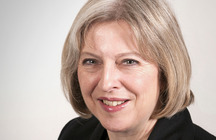Theresa May – 2018 Speech in Shanghai
Below is the text of the speech made by Theresa May, the Prime Minister, in Shanghai, China on 2 February 2018.
Thank you very much, Jack, and good morning everyone. And let me just say it’s a pleasure to see so many Chinese and British business leaders sitting side by side here today. I think It’s a very real expression of the golden era of relations between our countries.
I’ve talked a lot with my Chinese counterparts about this growing partnership between our two countries, but it’s important to recognise that it isn’t just about governments. It’s about businesses. About people. About bringing the UK and China closer together so that we can all share in the benefits of growth.
We meet today at a crucial time in the history and future of both our countries. Last year, at Davos, President Xi set out the case for globalisation and committed to a more open Chinese economy – a vision the UK is keen to help you bring to life.
Meanwhile, the UK is preparing to leave the European Union. We’re seizing the opportunity to become an ever-more outward-looking Global Britain, deepening our trade relations with nations around the world – including China.
Now this is my first time in Shanghai. On this side of the Huangpu, the eclectic old buildings speak to us of China’s history. On the opposite bank, the towering skyscrapers of Pudong say much about its future.
More than that, the Bund itself is testament to the deep historical roots of the UK’s trading links with China. The very building we meet in today started life as the home of a British ship-builder, the historic lifeblood of global trade. The Custom House clock, the international symbol of Shanghai, was made in Shropshire; its bells were cast in Leicestershire.
And just as the Bund says much about our trading past, the size of the audience today and the breadth of sectors represented, speaks volumes about the strength of our relationship in 2018.
Trade between our nations is worth almost £60 billion and rising. Chinese investment is helping the UK develop infrastructure and create jobs. Nearly 50,000 British businesses import goods from China, while more than 10,000 sell their goods to customers here.
And our businesses are already working closely with one another, real commercial partnerships that bring real benefits. Just look at Astra Zeneca and Alibaba, coming together to build a smart health system in Wuxi so chest patients get vital treatment more quickly.
As I’ve travelled around China over the last few days, I’ve seen that we have the potential to do so much more together.
In Wuhan, in Beijing and now here in Shanghai I’ve been struck by the level of enthusiasm for British brands, British culture, British goods and British services.
And that’s why I am accompanied on this trip by a business delegation representing businesses of every size and shape, representing many different sectors and hailing from every corner of the UK.
Some have long established contacts here in China.
Others are visiting for the very first time.
But all are completely committed to forging lasting relationships with businesses, investors and customers in your country.
This week, they’ve been finalising deals in sectors as diverse as financial services, education, energy and healthcare. Aston Martin has announced that it will significantly increase its operations in China with a five-year export drive worth £600m, and will have more than 20 showrooms across China.
And yesterday we unveiled a string of commercial deals in the cultural sector, increasing understanding and bringing our people closer together.
And I was particularly pleased to see the Busy Bees nursery group taking its place in the delegation. Late last year I enjoyed a marvellous visit to a nursery in my own constituency. Now they’re bringing their 35 years of expertise to Shanghai, with plans for a 230-place international pre-school here.
Now when people think of international trade I’m sure early-years childcare isn’t the first thing that springs to mind. But Busy Bees’ presence here shows just how diverse the British export offer is, just how much we have to offer in China.
While the business leaders have been negotiating commercial deals, I have been meeting with President Xi and Premier Li and discussing with them the importance of removing barriers to trade between our nations.
We’ve agreed on moves to bring more of the UK’s internationally renowned food and drink to China, to open up the market to some of Britain’s world-class financial services providers. And we have agreed a Trade and Investment Review, as a first step towards delivering ambitious future bilateral trade arrangements.
On Wednesday, Premier Li and I attended the inaugural meeting of the UK/China CEO Council.
Created with the full support of both governments, the council brings together 40 chief executives from some of Britain and China’s top businesses – many of them here today.
It creates a forum in which ideas and insights can be shared. But it is also a platform from which views, problems and solutions can be communicated to the top levels of government, giving senior business leaders the chance to help shape the future of the UK’s trade and investment relationship with China.
And it’s a future that excites me. Not just because of the possibilities for increased trade, impressive though they are. But also because of the possibilities for greater co-operation between our people.
China and the UK both have proud histories of innovation stretching hundreds, even thousands of years. That spirit of invention is still very much alive today, and if we pool our talents further the results could be extraordinary.
The fast-changing world we are in brings many opportunities for businesses in both our countries. And I support a partnership that allows us to exploit those opportunities, bringing together like-minded innovators and entrepreneurs to share knowledge, risk and investment.
For example, as I said in Davos last week, we are establishing the UK as a world leader in Artificial Intelligence, building on the success of companies like Deepmind.
I believe we have only just seen the beginning of what AI can achieve, something I discussed yesterday with President Xi. We agreed that prospects for collaboration in this area are ever-expanding.
But that is not all. In November I launched the UK’s modern industrial strategy. We set an ambition for Britain to be the most innovative country in the world. And we are backing that up with £7bn of additional investment in research and development over the coming years.
Then, in December we launched the UK-China Joint Strategy for Science, Technology and Innovation Co-operation. It brings together scientists and innovators to drive sustainable growth and tackle global challenges.
The Strategy’s priority for 2018 is agri-tech, and that’s one reason why I was pleased to be able to visit the Chinese Academy of Agricultural Sciences in Beijing yesterday, seeing some of this cooperation first hand.
Next month, we’re organising the Great Festival of Innovation in Hong Kong and the Bay area. Over four days, the Festival will offer a series of thought-provoking and lively keynotes, masterclasses, showcases, installations and performances involving industry leaders, entrepreneurs, and artists.
With visitors from the UK and right across Asia, the festival will allow entrepreneurs to build partnerships and share the innovations that will drive the future of free trade. I hope that many of you will be able to attend.
One thing that I hope will come from the festival is a higher profile for female innovators. The UK and China together have the capacity to play a huge role in advocating for gender equality. But all too often those good intentions don’t lead to positive outcomes, and that’s something we should all be working to tackle.
Last year, the UK government signed a memorandum of understanding with the All China Women’s Federation, setting out our mutual resolve to improve gender equality. And I know this subject is also close to Jack’s heart. In 2015, Alibaba ran a global conference on women and entrepreneurship. And the company itself has a much larger female workforce, and more women on its board,than most international tech companies.
Around the world, young women benefit from seeing that. From seeing role models and trailblazers. Women who have succeeded in their field and shown that progress is possible. And that’s why I’m proud to have brought many inspirational women in my business delegation.
Women like Nancy Rothwell, who spoke to you earlier and whose university, Manchester, has excellent links with Wuhan, the first stop on my visit, as well as across China. And women like Heba Bevan, founder and CEO of AI company UtterBerry.
I’m nearing the end of what has been a fascinating and productive few days in China. I’ve seen our businesses making new alliances and forging new partnerships. I’ve seen our people learning about the world through education and about each other through culture.
And I’ve seen that China and the UK are determined to build on our deep and mature ties to promote national and global prosperity throughout the 21st century.
As President Xi, quoting Shakespeare, said to me yesterday, “What’s past is prologue.” And I wholeheartedly agree. The UK and China are opening a new chapter in our Golden Era.
Thank you.


